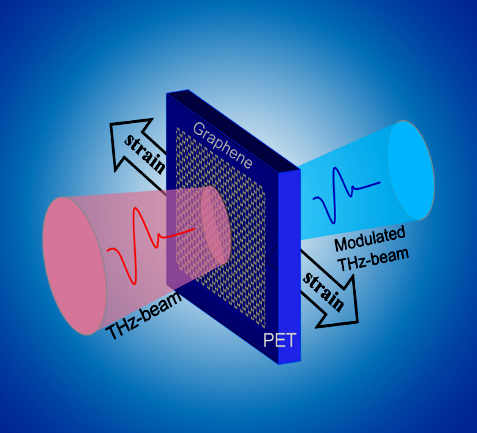Recently, researchers at High Magnetic Field Laboratory, Chinese Academy of Sciences (CHMFL) realized mechanical terahertz modulation based on grapheme for the first time.
Terahertz (THz) generally refers to sub-millimeter electromagnetic waves with frequencies between 1011 and 1013 Hz.
Tkanks to its excellent spectral performance, terahertz-related technology is known as "one of the top ten technologies that change the world in the future" and possesses great application potential in fields of communication, sensing, and national security. Terahertz modulator, as the key component of terahertz application, is one of the most important research objects.
In order to achieve high efficiency and low loss modulator, in addition to the traditional electrical and optical methods, new terahertz modulation approaches need to be explored.
The research group led by Professor SHENG Zhigao constructed a mechanical modulation device based on two-dimensional electrical material and systematically studied its strain modulation characteristics with self-built terahertz time domain spectroscopy system (THz-TDS).
It shows that graphene-based modulator possesses excellent modulation effect.
They found that modulation depth at 1 THz reaches 26% and could be further improved.
Moreover, it could be bidirectional modulated. The modulator under tensile and compressive strain shows positive and negative modulation effects, respectively.
And it also possesses excellent reversibility and stability, which benefits from the amazing mechanical and electrical properties of graphene.
In addition, the low insertion loss can be attributed to the distinctive mechanism that mainly originates from the modulation of the intrinsic carrier mobility distribution rather than extra excited non-equilibrium carriers. As a result, its insertion loss is far lower than electrical and optical approaches.
Based on the above advantages, the mechanism could be used in high speed terahertz modulator fabrication and possesses great potential in future terahertz applications.
The study was jointly conducted by JIN Zuanming from Shanghai University, and SU Fuhai from Institute of Solid State Physics, Hefei Institutes of Physical Science.
Results have been published in Advanced Optical Materials entitled Mechanical Terahertz Modulation Based on Single-Layered Graphene.
The research was supported by the National Natural Science Foundation of China, the National Key Research and Development Program of China, the Key Research Program of Frontier Sciences.

Diagram of Mechanical Terahertz Modulator (Image by CHENG Long)
Contact:
ZHOU Shu
Hefei Institutes of Physical Science (http://english.hf.cas.cn/)
Email: zhous@hfcas.ac.cn
 Tel: +86-551-65591206
Tel: +86-551-65591206
 Fax: +86-551-65591270
Fax: +86-551-65591270
 Emai: zhous@hfcas.ac.cn
Emai: zhous@hfcas.ac.cn
 350 Shushanhu Road
350 Shushanhu Road